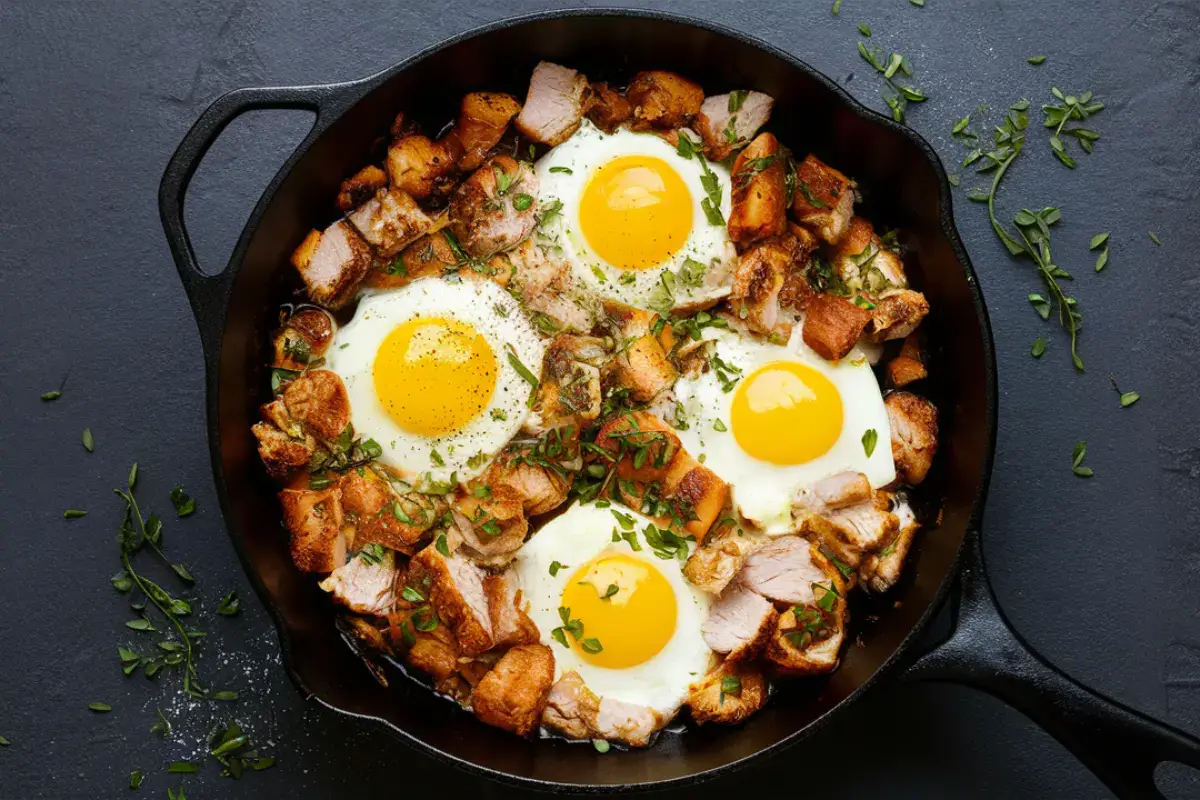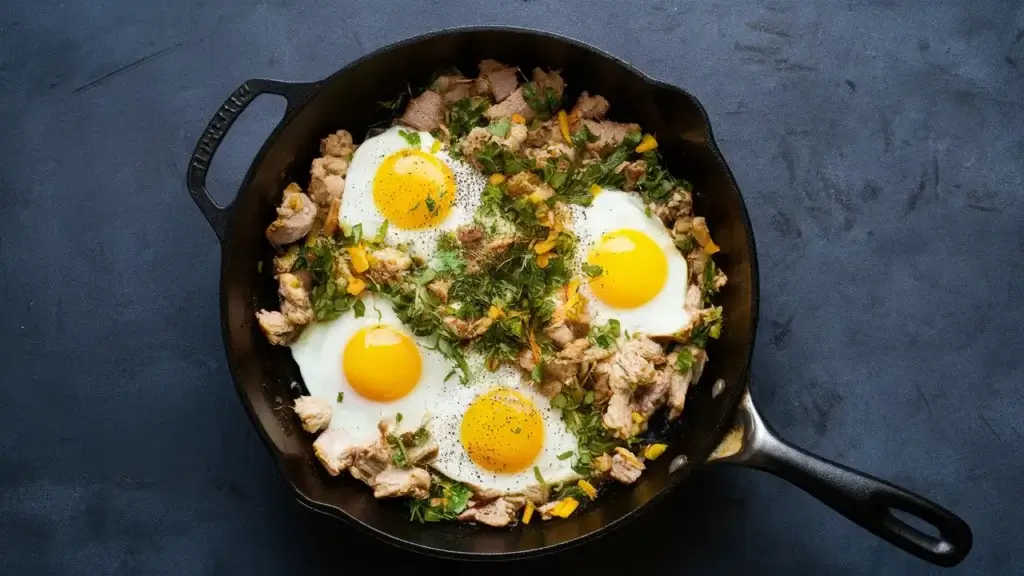In the culinary world, simplicity often meets satisfaction, and the classic combination of turkey and eggs exemplifies this perfectly. Whether you’re looking for a hearty breakfast, a satisfying lunch, or a quick dinner, this dynamic duo has you covered. In this blog post, we’ll dive deep into the world of turkey and eggs, exploring not just how to make a perfect dish but also the nutritional benefits, history, and cultural significance of this beloved pairing.
The Perfect Turkey and Eggs Recipe: A Step-by-Step Guide
Ingredients for Turkey and Eggs
When crafting the ultimate turkey and eggs dish, the quality and freshness of the ingredients play a crucial role. Here’s what you’ll need:
- 1 cup of ground turkey: Opt for lean ground turkey to keep the dish healthy. Ground turkey offers a rich source of protein, contains low fat, and provides vitamins and minerals like B6, niacin, and selenium.
- 4 large eggs: Eggs serve as a powerhouse of nutrition, offering high-quality protein, essential fats, and vital nutrients like choline, which supports brain health.
- 1 small onion, finely chopped: Onions add subtle sweetness and depth to the dish. They also come packed with antioxidants and anti-inflammatory properties.
- 1 clove of garlic, minced: Garlic provides a punch of flavor and is known for its health benefits, including boosting the immune system and reducing blood pressure.
- 1 small bell pepper, diced: Bell peppers contribute delightful crunch and a burst of color. They are high in vitamin C and other antioxidants.
- 2 tablespoons of olive oil: Olive oil, a heart-healthy fat, adds richness to the dish. It’s also packed with antioxidants and anti-inflammatory properties.
- Salt and pepper to taste: Seasoning plays a key role in bringing out the flavors of the dish. Be sure to season gradually and taste as you go.
- Fresh herbs like parsley or cilantro for garnish: Herbs add freshness and a pop of color, enhancing the overall presentation and taste of the dish.
Ingredient Substitutes and Variations

One of the beauties of this turkey and eggs recipe is its versatility. Here are a few substitutions you might consider:
- Ground chicken or beef: If turkey isn’t available, ground chicken or lean ground beef can work as substitutes. Keep in mind that turkey typically offers a leaner option, resulting in a lighter dish.
- Egg whites: For a lower-fat version, replace whole eggs with egg whites. This option suits those on a low-cholesterol diet.
- Vegetarian version: Replace turkey with a plant-based meat substitute, such as tofu or tempeh, for a vegetarian-friendly dish. Add more vegetables to bulk up the meal.
- Spices: Experiment with spices like cumin, paprika, or chili powder to give the dish a different flavor profile. These spices add warmth, smokiness, or a hint of heat to your turkey and eggs.
Cooking Instructions for Turkey and Eggs
Now that you have your ingredients ready, let’s walk through the cooking process step by step.
- Prepare the Ingredients: Start by chopping the onion, mincing the garlic, and dicing the bell pepper. Set them aside. Crack the eggs into a bowl, season with a pinch of salt and pepper, and whisk them until fully combined.
- Cook the Turkey: Heat olive oil in a large skillet over medium heat. Add the chopped onions and cook until they turn translucent, about 3-4 minutes. Add the minced garlic and cook for another minute, taking care not to burn it. Now, add the ground turkey to the skillet. Break it up with a wooden spoon and cook until browned and fully cooked, about 6-8 minutes. Season the turkey with salt and pepper.
- Add the Vegetables: Once the turkey is cooked, add the diced bell pepper to the skillet. Continue cooking for another 4-5 minutes until the bell peppers turn tender but still slightly crisp.
- Scramble the Eggs: Push the turkey and vegetable mixture to one side of the skillet. Pour the whisked eggs into the empty side of the skillet. Allow them to set slightly before gently scrambling them with a spatula. Once the eggs are mostly cooked but still a bit runny, mix them with the turkey and vegetables. Continue cooking until the eggs are fully cooked but still soft and fluffy.
- Garnish and Serve: Remove the skillet from the heat. Garnish the dish with fresh herbs like parsley or cilantro. Serve your turkey and eggs hot, either on their own or with a side of toast or a fresh salad.
Cooking Tips for Turkey and Eggs
- Avoid Overcooking the Eggs: The key to perfect scrambled eggs lies in cooking them low and slow. Overcooking will result in rubbery eggs. Remove the skillet from the heat when the eggs are still slightly runny, as they continue cooking from the residual heat.
- Use Fresh Herbs: Fresh herbs add a burst of flavor and vibrancy to the dish. If fresh herbs aren’t available, dried ones can be used, but remember that dried herbs are more concentrated, so use them sparingly.
- Adjust Seasoning Gradually: When seasoning the dish, start with a small amount of salt and pepper and adjust as needed. This prevents the dish from becoming overly salty.
The Nutritional Powerhouse: Benefits of Turkey and Eggs
Combining turkey and eggs creates a meal that is not only delicious but also packed with nutrients. Let’s break down the nutritional benefits of each main component.
Turkey: Lean Protein with Numerous Benefits
Turkey provides an excellent source of lean protein, making it a popular choice for those looking to build muscle, lose weight, or maintain a healthy diet. A 3-ounce serving of ground turkey delivers about 22 grams of protein while being relatively low in calories and fat.
- Rich in B Vitamins: Turkey offers a great source of B vitamins, particularly niacin (B3) and vitamin B6. These vitamins are essential for energy production, brain function, and maintaining a healthy metabolism.
- Low in Saturated Fat: Compared to red meats like beef, turkey contains less saturated fat, making it better for heart health. Choosing lean ground turkey helps reduce the intake of unhealthy fats.
- High in Selenium: Selenium serves as a powerful antioxidant that supports immune function and thyroid health. Turkey offers a good source of this important mineral.
Eggs: A Nutritional Powerhouse
Eggs often earn the title of nature’s multivitamin because they contain a little bit of almost every nutrient you need. Each large egg provides about 6 grams of high-quality protein and a wealth of vitamins and minerals.
- Complete Protein: Eggs contain all nine essential amino acids, making them a complete source of protein. This is particularly important for muscle repair and growth.
- Choline: Eggs rank among the best sources of choline, a nutrient vital for brain health and the development of the nervous system.
- Vitamin D: Eggs serve as one of the few natural sources of vitamin D, crucial for bone health, immune function, and mood regulation.
A Perfect Pair: Why Turkey and Eggs Work So Well Together
The combination of turkey and eggs makes for a nutritionally balanced meal. Here’s why:
- High Protein Content: Both turkey and eggs provide rich sources of protein, making this dish particularly satisfying and ideal for muscle repair and growth.
- Balanced Fats: Eggs provide healthy fats, including omega-3s, while turkey contributes lean protein. This balance supports heart health and keeps you full longer.
- Nutrient Variety: Together, turkey and eggs offer a wide range of essential nutrients, from B vitamins and selenium in turkey to choline and vitamin D in eggs.
History and Cultural Significance of Turkey and Eggs
The combination of turkey and eggs may seem straightforward, but it has deep roots in culinary history. Let’s explore how these ingredients have been used across different cultures and times.
The Evolution of Turkey in Cuisine
Turkey, native to North America, has served as a staple in the diet of indigenous peoples for centuries. It gained popularity in Europe after explorers introduced it in the 16th century, quickly becoming a key part of holiday meals, particularly in the United States and Canada.
- Thanksgiving Tradition: In the U.S., turkey became synonymous with Thanksgiving, a tradition that dates back to the early 17th century. The bird was chosen for its size and ability to feed large families, making it the centerpiece of the holiday meal.
- Global Popularity: Turkey also gained popularity in global cuisine, often used as a leaner alternative to other meats in dishes like kebabs, curries, and stews.
Eggs: A Universal Staple
Eggs have been a dietary staple across the world for thousands of years. They serve as one of the most versatile ingredients, used in a variety of dishes from breakfast to dessert.
- Symbolism in Culture: Eggs have long symbolized life and fertility in many cultures. For example, in Christian tradition, eggs are associated with Easter and represent resurrection and new life.
- Culinary Versatility: Eggs find use in countless ways, from simple preparations like boiled or scrambled eggs to more complex dishes like soufflés and custards. Their binding properties also make them essential in baking and cooking.
The Fusion of Turkey and Eggs in Modern Cuisine
The pairing of turkey and eggs represents a relatively modern culinary fusion, born out of the desire for healthy, protein-packed meals. This combination proves particularly popular in fitness and health communities, where high-protein diets are emphasized.
- Fitness-Friendly Meal: With the rise of health-conscious eating, turkey and eggs have become a go-to meal for those looking to increase their protein intake without consuming too many calories.
- Brunch Staple: In recent years, turkey and eggs have found a place in the brunch culture, often featured in dishes like turkey hash, omelets, and breakfast bowls.
Variations of Turkey and Eggs Around the World
While turkey and eggs are a popular combination in many Western countries, variations of this dish can be found around the globe. Let’s explore how different cultures have embraced and adapted this pairing.
Turkish Menemen with Ground Turkey
Menemen, a traditional Turkish dish, is made with eggs, tomatoes, peppers, and onions. Incorporating ground turkey adds a twist, making it a heartier meal.
- Ingredients: Eggs, ground turkey, tomatoes, green peppers, onions, olive oil, salt, and pepper.
- Preparation: Cook the ground turkey with onions, peppers, and tomatoes until tender. Add eggs and cook until they set slightly. Serve the dish with bread.
Mexican Turkey and Egg Tacos
In Mexico, eggs and meat often combine in breakfast dishes like tacos or burritos. Adding turkey to these traditional recipes provides a leaner alternative to chorizo or beef.
- Ingredients: Eggs, ground turkey, tortillas, salsa, avocado, cilantro, lime, and cheese.
- Preparation: Cook the ground turkey with spices like cumin and chili powder. Add scrambled eggs, then serve the mixture in warm tortillas, topped with salsa, avocado, and cilantro.
American Turkey and Egg Breakfast Bowl
In the U.S., breakfast bowls have become a popular way to enjoy a balanced, hearty meal. Combining turkey and eggs with various vegetables and grains makes for a nutritious start to the day.
- Ingredients: Eggs, ground turkey, quinoa or brown rice, spinach, bell peppers, avocado, and hot sauce.
- Preparation: Cook the turkey with vegetables, then combine it with cooked quinoa or rice. Top the dish with scrambled eggs, avocado, and hot sauce as garnish.
Japanese Tamagoyaki with Turkey
Tamagoyaki, a Japanese rolled omelet, often includes eggs and various fillings. Adding ground turkey creates a protein-rich version of this dish.
- Ingredients: Eggs, ground turkey, soy sauce, sugar, mirin, and dashi.
- Preparation: Season the turkey with soy sauce and cook until done. Whisk the eggs with sugar, mirin, and dashi, then cook in a rectangular pan. Add the turkey before rolling the omelet into a log shape.
Tools and Equipment for Making Turkey and Eggs
To achieve the best results when making turkey and eggs, using the right tools and equipment is crucial. Here’s a list of kitchen essentials that will make the cooking process smoother and more enjoyable.
Skillet or Frying Pan
A high-quality skillet or frying pan is essential for cooking the turkey and eggs evenly. Non-stick pans ensure that the eggs don’t stick and scramble easily. A cast-iron skillet can also serve as a great option, retaining heat well and adding flavor to the dish over time.
Spatula
A good spatula is important for scrambling the eggs and ensuring even cooking. Silicone spatulas work well with non-stick surfaces and are flexible enough to scrape every bit of food from the pan.
Mixing Bowls
A mixing bowl is necessary for whisking the eggs before adding them to the skillet. Having a set of mixing bowls in various sizes makes preparing and mixing ingredients easier.
Chef’s Knife
A sharp chef’s knife is indispensable for chopping onions, mincing garlic, and dicing bell peppers. A good knife speeds up prep work and improves efficiency.
Cutting Board
A sturdy cutting board provides a safe surface for chopping and preparing ingredients. Choose one that is easy to clean and large enough to handle all the ingredients.
Measuring Cups and Spoons
Accurate measurement is key to the success of any recipe. Measuring cups and spoons ensure you use the right amount of each ingredient, which is particularly important for seasoning.
Serving Plates
Presentation matters! Choose attractive serving plates or bowls to showcase your turkey and eggs. Garnishing with fresh herbs or avocado slices elevates the dish visually.
How to Store and Reheat Turkey and Eggs
If you have leftovers or want to prepare your turkey and eggs in advance, proper storage and reheating are important to maintain the dish’s quality and safety.
Storing Turkey and Eggs
- Refrigeration: Store the cooked turkey and eggs in an airtight container in the refrigerator. They stay fresh for up to 3 days. Cool the dish to room temperature before sealing and refrigerating it.
- Freezing: While eggs can become a bit rubbery when frozen, you can freeze turkey and eggs for longer storage. Place the dish in a freezer-safe container or freezer bag, removing as much air as possible. It keeps in the freezer for up to 2 months.
Reheating Turkey and Eggs
- Microwave: The quickest way to reheat turkey and eggs involves using the microwave. Place the dish in a microwave-safe container, cover it loosely with a lid or microwave-safe wrap, and heat on medium power for 1-2 minutes, stirring halfway through.
- Stovetop: For more even heating, reheat the turkey and eggs on the stovetop. Add a small amount of oil or butter to a skillet and heat on medium-low. Add the leftovers and cook, stirring occasionally, until heated through.
- Oven: To reheat larger portions, use the oven. Preheat the oven to 300°F (150°C). Place the turkey and eggs in an oven-safe dish, cover with foil, and heat for 10-15 minutes, or until warmed through.
Frequently Asked Questions About Turkey and Eggs
Can I Use Leftover Turkey for This Recipe?
Absolutely! If you have leftover cooked turkey from a previous meal, easily incorporate it into this recipe. Shred or chop the cooked turkey and add it to the skillet when you would normally add the raw ground turkey. Since the turkey is already cooked, you’ll only need to heat it through before adding the eggs.
What Are Some Side Dishes That Pair Well with Turkey and Eggs?
Turkey and eggs are quite versatile and pair well with a variety of side dishes depending on the time of day and the occasion. For breakfast or brunch, consider serving them with toast, avocado slices, or a fresh fruit salad. For lunch or dinner, roasted vegetables, a mixed greens salad, or quinoa make excellent sides that complement the dish’s flavors and nutritional profile.
How Can I Make This Dish Spicier?
If you’re a fan of spicy food, there are several ways to add heat to this turkey and eggs recipe. Incorporate diced jalapeños or red chili flakes when cooking the vegetables. Alternatively, add a dash of hot sauce or a sprinkle of cayenne pepper to the finished dish. For more intense heat, try using spicy ground turkey, which is often seasoned with paprika, cayenne, and other hot spices.
Is This Recipe Suitable for Meal Prep?
Yes, turkey and eggs work wonderfully for meal prep. Prepare the dish in advance and store it in the refrigerator for up to 3 days. You can also divide the cooked dish into individual portions and freeze them for up to 2 months. When reheating, follow the reheating instructions provided above to maintain the best texture and flavor.
Can I Add Cheese to This Recipe?
Certainly! Adding cheese to the turkey and eggs dish enhances its flavor and adds a creamy texture. Cheddar, feta, or mozzarella work well. Simply sprinkle the cheese over the eggs and turkey in the skillet during the last minute of cooking, allowing it to melt slightly before serving.
Conclusion: Why Turkey and Eggs Should Be a Staple in Your Kitchen
Turkey and eggs offer more than just a convenient meal option; they represent a culinary powerhouse packed with nutrients, flavor, and versatility. Whether you’re preparing a quick breakfast, a hearty lunch, or a satisfying dinner, this combination provides endless possibilities. From the rich history and cultural significance of these ingredients to the modern variations and health benefits they deliver, turkey and eggs deserve a regular spot in your meal rotation.
By mastering this simple yet flavorful dish, you’ll not only enjoy delicious meals but also gain valuable cooking skills that apply to various other recipes. So, the next time you’re in need of a protein-packed, nutrient-rich meal, remember the humble yet mighty pairing of turkey and eggs.

